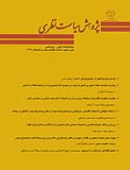زبان و سياست؛ ابعاد عملی و راهبردي زبان در رهبري امام خميني(ره) در فرایند انقلاب اسلامی
محورهای موضوعی : Research in Theoritical Politics
1 - عضو هیات علمی
کلید واژه: امام خمینی(ره) زبان سیاست حکومت اسلامی عمل سیاسی,
چکیده مقاله :
انقلاب اسلامی در ایران با یک رهبری مذهبی تأثیرگذار به پیروزی رسید. با توجه به اینکه رهبری انقلاب در تبعید به سر میبرد و از همۀ امکانات رسانه ای و ارتباطی با مردم محروم بود، پیوند محکمی میان رهبری انقلاب و مردم برقرار شد. این مسئله در این مقاله، مبنای بررسی نسبت زبان و سیاست و کوشش برای تبیین جنبههای عملی و راهبردی زبان در رهبری امام در دورۀ انقلاب قرار گرفته است. در مطالعات نسبت زبان و سیاست، دو رویکرد کلی سیاست چونان امری به معرفت و نظر و سیاست به مثابه قدرت و قلمرو عمل جمعی و در جهت حفظ یا تغییر وضع موجود حاکم است. در این مقاله بر اساس رویکرد دوم و با استفاده از نظریههایی که در آن بر قابلیتها و کارکردهای عملی، رسانه ای، شبکه ای و بسیج کننده زبان تأکید داشتهاند، ابعاد و کارکردهای اثربخش و عملی زبان در اندیشۀ امام خمینی(ره) بررسی شده است. یافتههای این بررسی نشان میدهد که امام(ره) با داشتن تحصیلات تخصصی در سه حوزۀ عرفان، اخلاق و فقه و با توجه به طبقه بندی خاص خود از علوم اسلامی، بر عمل گرایی به عنوان مشترک این سه حوزه تأکید کرده و زبان را در راستای عمل سیاسی و انقلابی در این سه حوزه به کار میگیرد. بسیج گری، انتقادگری و مخالفت با وضع موجود و دعوت و برانگیختن مردم به تأسیس حکومت جدید، از ابعاد کارکردی زبان در رهبری امام است.
Islamic revolution realized in Iran under the leadership of a religious leader. Although the leader was in exile but he had strong connections with his followers despite his deprivation of communication means. This issue in this paper is the basis of reviewing the relationship between language and politics; so the paper tries to explain pragmatic and strategic aspects of language in Imam Khomeini's leadership in the process of Islamic revolution. In the field of study of relationship between language and politics, there are two general approaches: politics as theory and knowledge and politics as power and the realm of collective action to sustain or to change the current situation. This paper, by focusing on the second approach and by using the theories of language competence and language pragmatics in the realm of media and in mobilization of mass, will try to examine influential functions and pragmatic aspects of language in Imam Khomeini's thoughts. The findings indicate that Imam Khomeini as a scholar in mystics, ethics and jurisprudence and by his own classification of Islamic sciences introduced the pragmatism as the core of those sciences and used the language along political and revolutionary actions. Mobilizing the mass, criticizing and opposing the current situation and inviting the people to realize the Islamic state are among Imam Khomeini's pragmatic aspects of leadership.


